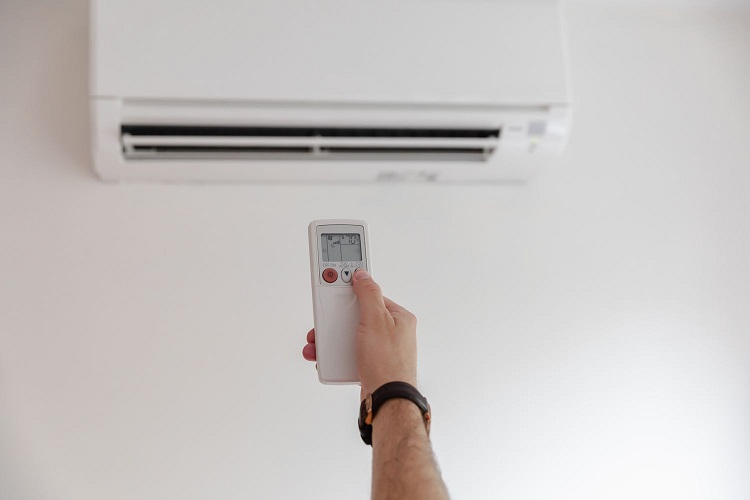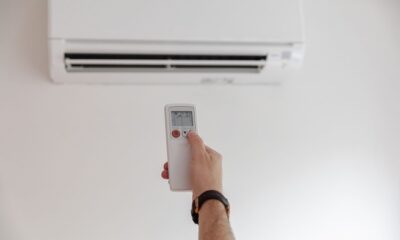Home Improvement
Can Your Air-Conditioning Keep Up with the Heat Waves?

As temperatures continue to rise, it’s essential to ensure that your air-conditioning is up to the task of keeping you cool and comfortable. With heat waves becoming more frequent and intense, having a reliable air-conditioning system is crucial for maintaining a comfortable living environment. In this article, we’ll discuss some key factors to consider when evaluating whether your air-conditioning can withstand the demands of extreme heat.
What is a Heat Wave?
A heat wave is defined as a prolonged period of abnormally high temperatures, typically lasting two or more days. With climate change and global warming, heat waves are becoming increasingly frequent and intense. This can pose serious health risks, especially for vulnerable populations such as the elderly, children, and those with pre-existing medical conditions. Having a functioning air-conditioning system can help mitigate these risks by providing a cool and comfortable environment indoors.
How Deadly are Heat Waves?
Heat waves are responsible for more deaths in the United States than any other extreme weather event. According to the Centers for Disease Control and Prevention, an average of 600 people die from heat-related illnesses each year in the US alone. The numbers are even higher in countries with hotter climates. Therefore, it’s crucial to have a reliable air-conditioning system that can keep up with the demands of extreme heat and help prevent these tragic outcomes.
Size and Efficiency
The size and efficiency of your air-conditioning unit are two crucial factors that determine its ability to keep up with heat waves. If your system is too small for your space, it will struggle to cool the area effectively, especially during extreme temperatures. On the other hand, an oversized system may cycle on and off more frequently, reducing its efficiency and lifespan. It’s essential to have a professional assess your space’s cooling needs and recommend the appropriate size and type of air-conditioning unit.
Regular Maintenance
Like any other appliance, regular maintenance is necessary for optimal performance. Neglecting routine maintenance can lead to malfunctions, reduced efficiency, and even complete system failure. With extreme heat putting additional strain on your air-conditioning system, it’s crucial to have it serviced at least once a year by a licensed technician. This maintenance should include cleaning or replacing filters, checking refrigerant levels, and inspecting for any potential issues.
Energy Efficiency
With rising energy costs and environmental concerns, energy efficiency is an important consideration when evaluating your air-conditioning’s ability to handle heat waves. Older units may be less efficient than newer models, leading to higher electricity bills and increased carbon footprint. Investing in an energy-efficient air-conditioning unit can not only save you money in the long run but also reduce your impact on the environment.
Proper Insulation
The insulation in your home or building plays a significant role in maintaining comfortable temperatures and reducing strain on your air-conditioning system. Poor insulation can result in cool air escaping, making it harder for your air-conditioning to keep up with extreme heat. It’s crucial to ensure that your walls, attic, and windows are properly insulated to maximize the efficiency of your air-conditioning unit. For better advice on how to protect your home from heat waves, call Comfort Tech Heating & Air Conditioning and ask for an expert to give you the proper information.
Signs Your Air-Conditioning May Not Be Able to Keep Up
- Uneven Cooling: One of the first signs that your air-conditioning may not be able to handle extreme heat is uneven cooling throughout your space. If certain areas of your home feel significantly warmer than others, it could be an indication of a malfunctioning system or improper installation.
- Frequent Breakdowns: Another red flag that your air-conditioning may not be able to keep up with the heat is frequent breakdowns and malfunctions. As temperatures rise, your AC unit works harder to maintain a cool temperature, which can put extra strain on its components. This can lead to more frequent breakdowns and costly repairs.
- High Energy Bills: If you’ve noticed a sudden increase in your energy bills without a change in your usage, it could be a sign that your air-conditioning system is struggling to keep up with the extreme heat. An inefficient or malfunctioning system will have to work harder and use more energy to maintain a cool temperature.
- Loud Noises: Unusual noises such as rattling, banging, or screeching coming from your AC unit can indicate an issue that needs to be addressed. These noises may be caused by worn-out components or other problems within the system that can affect its ability to cool effectively.
- Old Age: The average lifespan of an air-conditioning unit is around 10-15 years. If your system is approaching or past this age, it may not be able to handle the demands of extreme heat as effectively as a newer unit. Consider upgrading to a more energy-efficient model for better performance and lower energy bills.
How to Ensure Your Air-Conditioning Can Keep Up
- Regular Maintenance: The best way to ensure your air-conditioning can keep up with the heat waves is by scheduling regular maintenance check-ups with a professional technician. They will inspect and clean your system, identify any potential issues, and make necessary repairs.
- Keep Filters Clean: Dirty air filters can restrict airflow and put extra strain on your AC unit, leading to reduced efficiency and potentially causing it to break down. Make sure to clean or replace your filters every 1-3 months.
- Improve Insulation: Proper insulation is essential for maintaining a cool indoor environment during heat waves. Check the insulation in your home and make necessary improvements to keep the cool air inside.
- Upgrade Your System: If your air-conditioning system is old or constantly breaking down, consider upgrading to a newer, more energy-efficient model. Not only will this ensure better performance during extreme heat, but it can also save you money on energy bills in the long run.
As heat waves become more common, it’s essential to evaluate whether your air-conditioning system is capable of handling extreme temperatures. Factors such as size, maintenance, energy efficiency, and insulation all play a role in determining your air-conditioning’s ability to keep you cool and comfortable. By considering these factors and investing in regular maintenance and energy-efficient units, you can ensure that your home or building remains a refuge from the scorching summer heat.















You must be logged in to post a comment Login